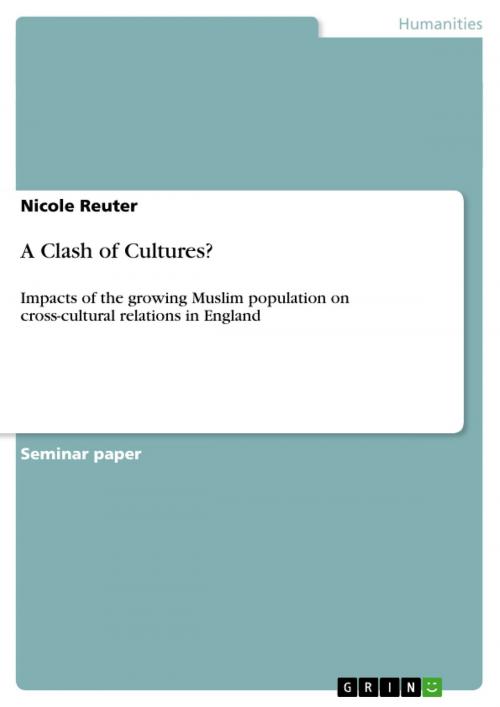A Clash of Cultures?
Impacts of the growing Muslim population on cross-cultural relations in England
Nonfiction, Social & Cultural Studies, Social Science, Anthropology| Author: | Nicole Reuter | ISBN: | 9783640271337 |
| Publisher: | GRIN Publishing | Publication: | February 20, 2009 |
| Imprint: | GRIN Publishing | Language: | English |
| Author: | Nicole Reuter |
| ISBN: | 9783640271337 |
| Publisher: | GRIN Publishing |
| Publication: | February 20, 2009 |
| Imprint: | GRIN Publishing |
| Language: | English |
Seminar paper from the year 2008 in the subject Cultural Studies - Miscellaneous, grade: B , Aalborg University (Humanities), course: Communication, Identity and Globalization, 43 entries in the bibliography, language: English, abstract: In recent years, reports on cultural conflicts have been a regular part of the daily news. The press and media coverage varies from big news stories, such as the so-called War on Terror or the conflict between Israelis and Palestinians in the Gaza Strip, to more domestic incidents such as racially motivated crimes in various European countries. Some scholars, such as Samuel P. Huntington, hold deeply ingrained cultural differences responsible for those conflicts. With the rise of global phenomena (i.e. demographic shifts, asylum seekers, emigration throughout Europe) ethno-nationalism and nationalism are also on the rise. Taking a closer look at Britain, being a former colonial power and a nation characterized by a high immigrant population, exemplifies the different attitudes towards multiculturalism across society. By promoting a sense of 'Britishness', extreme right-wing parties such as the British National Party (BNP) try to secure the cultural dimensions of what it means to be British. This not only affects nations, but most of all communities within nations, specifically minority groups. In contrast to the very concept of multiculturalism, forces are gathering within nations to go back to their roots. With the fall of the Soviet Union, much of the world's attention has been placed on the Islamic world. This attention primarily focuses on the last remainders of highly differential cultural context of Muslim nations. Therefore, hyperglobalists such as Ohmae and Reich argue that globalization melts away cultural dissonances and brings the Muslim world into the West. However, the arrival of Islam into Western nations, such as France, England or Germany, often causes a serious identity crisis among natives and immigrants. Members of both sides want to preserve their heritage by assimilating the other side. As a result, this 'clash of civilizations', results in both sides breeding fundamentalist wings within their culture to preserve their own identity. Incidents such as the London and Madrid bombings or the race riots of 2001 in England are just a few examples. Having those recent conflicts and developments in mind, several questions arise: In how far has a clash of civilizations occurred on a domestic level (i.e. England) and - if so - can those conflicts be ascribed to differing cultural factors?
Seminar paper from the year 2008 in the subject Cultural Studies - Miscellaneous, grade: B , Aalborg University (Humanities), course: Communication, Identity and Globalization, 43 entries in the bibliography, language: English, abstract: In recent years, reports on cultural conflicts have been a regular part of the daily news. The press and media coverage varies from big news stories, such as the so-called War on Terror or the conflict between Israelis and Palestinians in the Gaza Strip, to more domestic incidents such as racially motivated crimes in various European countries. Some scholars, such as Samuel P. Huntington, hold deeply ingrained cultural differences responsible for those conflicts. With the rise of global phenomena (i.e. demographic shifts, asylum seekers, emigration throughout Europe) ethno-nationalism and nationalism are also on the rise. Taking a closer look at Britain, being a former colonial power and a nation characterized by a high immigrant population, exemplifies the different attitudes towards multiculturalism across society. By promoting a sense of 'Britishness', extreme right-wing parties such as the British National Party (BNP) try to secure the cultural dimensions of what it means to be British. This not only affects nations, but most of all communities within nations, specifically minority groups. In contrast to the very concept of multiculturalism, forces are gathering within nations to go back to their roots. With the fall of the Soviet Union, much of the world's attention has been placed on the Islamic world. This attention primarily focuses on the last remainders of highly differential cultural context of Muslim nations. Therefore, hyperglobalists such as Ohmae and Reich argue that globalization melts away cultural dissonances and brings the Muslim world into the West. However, the arrival of Islam into Western nations, such as France, England or Germany, often causes a serious identity crisis among natives and immigrants. Members of both sides want to preserve their heritage by assimilating the other side. As a result, this 'clash of civilizations', results in both sides breeding fundamentalist wings within their culture to preserve their own identity. Incidents such as the London and Madrid bombings or the race riots of 2001 in England are just a few examples. Having those recent conflicts and developments in mind, several questions arise: In how far has a clash of civilizations occurred on a domestic level (i.e. England) and - if so - can those conflicts be ascribed to differing cultural factors?















